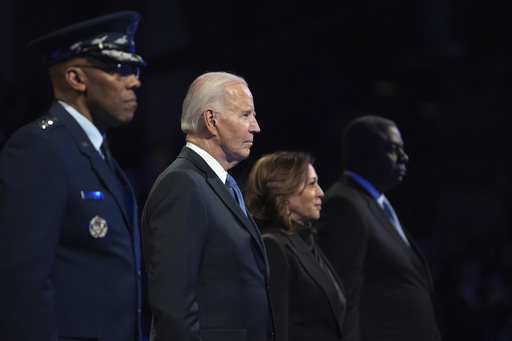In Washington, uncertainty looms over who will lead the Pentagon and the armed forces when all top leaders exit their positions on Monday coinciding with the inauguration of President-elect Donald Trump. As of Friday, officials acknowledged that they had yet to determine who would step in as the new acting defense secretary. The current chiefs of the services for the Army, Navy, and Air Force are preparing to assume the roles of acting secretaries, which is an unusual practice, as no civilian successors have been appointed, and some individuals have declined the opportunity.
As is standard protocol, all political appointees are set to vacate their posts by noon EST on Inauguration Day, leading to a significant number of critical defense positions becoming vacant, including many that necessitate Senate confirmation. In addition to the defense secretary and the three service secretaries, all their deputies and senior policy advisors will also depart their positions.
The Senate Armed Services Committee is anticipated to cast a vote on Monday regarding Trump’s nominee for the Defense Department, Pete Hegseth. However, a final vote by the full Senate may be delayed by a few days, creating a need for someone from the Biden administration to provide temporary leadership.
For the secretaries of the services, while situations may still evolve before the inauguration, reports indicate that Trump’s team is considering General Randy George, who currently serves as the Army’s chief of staff, for the temporary position of Army secretary. Additionally, General David Allvin, chief of staff for the Air Force, and Admiral Lisa Franchetti, who heads the Navy, are on alert to step in should no civilian be named as acting secretary. They are preparing for this eventuality.
Sources familiar with the matter, who requested anonymity due to the sensitive nature of the discussions, indicated that many senior leaders currently within the Biden administration are hesitant to join the incoming Trump administration due to concerns about potential policy shifts they may be pressured to manage. Ordinarily, only individuals appointed directly by the president and confirmed by the Senate are designated as defense or service secretaries, even if temporarily during a transition. Trump might opt to remove a confirmed official from a different agency within the Biden administration to serve at the Pentagon.
While civilian oversight of the military is a fundamental principle, legal provisions allow for the military chiefs — all of whom are Senate-confirmed — to temporarily take the reins. Although this is rare, similar situations have occurred in the past. Retired Marine Corps Reserve two-star general Arnold Punaro recounted an instance from 1993 when Admiral Frank Kelso served as acting Navy secretary when Bill Clinton was inaugurated, as civilian leaders did not emerge.
Punaro noted that unusual scenarios such as military personnel stepping into civilian leadership positions don’t often happen, recalling, “Normally you don’t want the active-duty military serving in the civilian control positions. The practical reality is they are wearing both hats.” Typically, the shift to a new secretary of defense is seamless. Four years prior, the then-deputy secretary of defense under Trump, David Norquist, fulfilled the role of acting secretary for the two-day gap that followed Biden’s inauguration until Lloyd Austin was confirmed.
In 2009, President Barack Obama retained his predecessor’s defense secretary, Robert Gates, during his transition. Furthermore, Trump’s first-term choice for secretary, Jim Mattis, was confirmed on Inauguration Day in 2017. Different administrations have managed these transitions with varying approaches. In many situations, officials have been asked to continue in a temporary capacity. Recently, it was reported that service comptrollers acted as interim secretaries, as key responsibilities, such as formulating the extensive and complicated budget, demand individuals less encumbered by political affiliations.
This year’s transition is complicated by Trump’s and Hegseth’s shared commitment to purge the Defense Department of what they label as “woke” generals — those who support diversity initiatives. This raises concerns that the administration might not only struggle to secure political appointees but may also disrupt the existing military leadership structure. In response to Senator Elissa Slotkin’s inquiry during his nomination hearing about potentially dismissing current Joint Chiefs chairman, General CQ Brown, Hegseth replied, “Senator, every single senior officer will be reviewed based on meritocracy, standards, lethality, and commitment to lawful orders they will be given.”
Hegseth has previously expressed that he believes Brown should be relieved of his duties. Additionally, conservative organizations have compiled lists of generals they deem should be terminated for endorsing diversity programs. Should General Brown be removed, the vice chairman would assume leadership until a new chairman is officially appointed.



